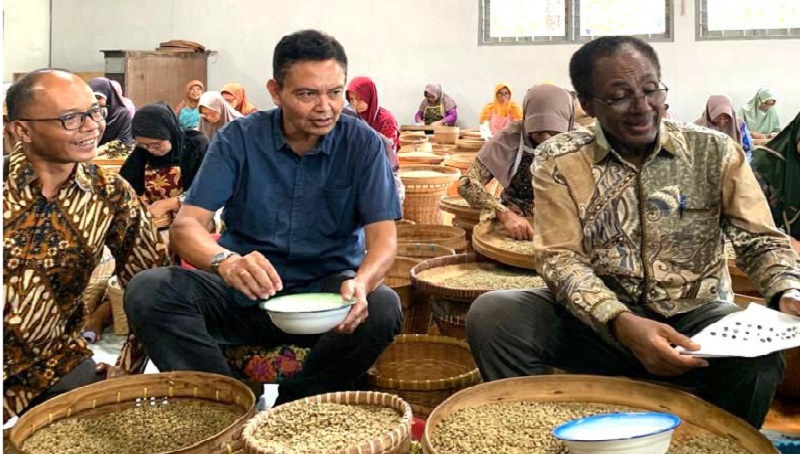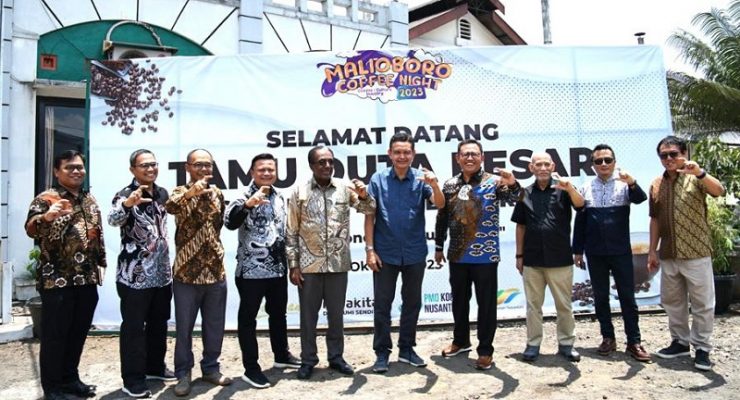“MALIOBORO Coffee Night “ in Yogyakarta which has been taking place since October 1, 2023 ended last night.
According to Wisnu Imam Birowo, Chair of the Nusantara Coffee Community, explained to journalists and the media about the implementation of “Malioboro Coffee Night” (MCN). He further stated that MCN not only introduces coffee products, but also the wisdom values of coffee itself and concern for the environment. For this reason, the touch to collaborate with foreign parties is very prominent.
While waiting for the results of the calculation regarding the committee’s income related to ongoing transactions, it’s a good idea to see what MCN has achieved this time.
“The presence of the Netherlands and Ethiopia at the MCN proves that this event is important. At the very least, efforts are made to boost exports abroad,” said Wisnu Birowo.
Wishnu further explained that of the dozens of tenants who took part in the event, most of them came from outside Yogyakarta. This distribution is carried out so that more people know the taste of local coffee which is no less interesting than coffee in general.
“The participants come from Ambon, East Java, Central Java, West Java. There are those from Banten too. We want to echo the message, people should know how diverse our coffee is,” he explained.
Meanwhile Fathoni, one of the Committee’s member said even invited these foreign Ambassadors to visit the coffee plantations in Banaran, Central Java. This is important. Considering that through coffee tourism, foreign participants can see a positive picture of Indonesian coffee which is unique and internationally recognized.
Through MCN 2023, Yogyakarta has been declared an international coffee hub. There is a desire from the MCN committee that next year the scale will be even bigger. Why is that? According to Wisnu, with the designation of Yogyakarta as a hub, the MNC will not only be held in the city of Yogyakarta, but also in other cities such as Bandung, Semarang, Solo and Banyuwangi.
The MCN committee’s wish is that next year the scale will be even bigger. Why is that? According to Vishnu, with the designation of Yogyakarta as a hub, the MNC will not only be held in the city of Yogyakarta, but also in other cities such as Bandung, Semarang, Solo and Banyuwangi.
According to these cities are important supports, especially coffee raw materials. The showcase is in Yogyakarta.
“We know that East Java, West Java and Central Java are among the large raw material production areas in Java,” said Wishnu. He also added that Yogyakarta has a strategic position in the middle to be able to absorb from these 3 regions.
So far, people have only seen coffee for economic needs and people’s welfare. Actually, it is more than that. Culture that has been rooted for 7 centuries makes coffee an integral part of cultural heritage. It seems that the Indonesian people have not yet realized this. Not to mention the threat to the world’s ecosystem which requires caution in managing forests.
It seems that Indonesia’s efforts will be in vain if there is no awareness from stakeholders. Next is education about coffee. Everyone should be aware of this. Thank God, the Indonesian Ministry of Foreign Affairs has introduced coffee to its diplomats since they join the Ministry.
Next, coffee must also be seen from its quality, not just an agricultural commodity. With the wealth of single origins and geographical indications, we can actually sell quality coffee. Even through INA Access, sales and business formats have increased.
Considering that the results to be achieved are also large, it seems that the MCN committee for next year will have to be even tougher. With greater effort the results will increase. Coordination between policy makers, the world of education and business circles can be organized more neatly. Collaboration between regional governments, where heads of departments that handle coffee can work together. Then researchers and educators also work together.

What is no less important is coordination of problems because it involves follow-up. Just look at Brazil, Vietnam and Colombia. They are focused and precisely looking for targets. There was a visit to the plantation in Banaran. I tagged along and we exchanged views with the Ethiopian delegation. The Ethiopian Ambassador was amazed to see the results of coffee processing in Banaran.
I remember the speech by Sri Sultan Hamengku Buwono X, delivered by Head of the Economic and Natural Resources Administration Bureau of the Regional Secretariat of DIY, Mrs. Yuna Pancawati on October 1 2023:
“For business people, we hope that the 5th Malioboro Coffee Night event will be able to become a medium for market development, business promotion and strengthening networking and collaboration between business to business (B to B) and Business to Customer (B to C”).
Then on the second day, October 2 2023, we held a discussion entitled ”Improving the Quality of Indonesian Coffee based on Cultural Heritage, Environment and Tourism”. The discussion agreed on the views of each party regarding the role of coffee from an economic, cultural and environmental perspective.
The role of diplomacy is important today. Because being able to make coffee has strategic value not only in terms of economics but also human and cultural dignity. In this regard, UNESCO’s recognition of Yogyakarta as the “Yogyakarta Philosophical Axis” can be used as a place for joint learning about the universal values needed to create a new, better world in the future.
The implementation of “Malioboro Coffee Night” itself is a kind of “show case”. It is necessary to continue comprehensive outreach and discussions between coffee entrepreneurs, educational and cultural institutions, agencies that play a role in coffee exports and the ecosystem/environment and representatives of Indonesia abroad.
Coffee is increasingly relevant to discuss at a time when all countries cannot avoid recession and food insecurity. Food security must be strong, with prosperous coffee farmers and better environmental management.
[Written by Bagas Hapsoro, coffee diplomacy activist. Indonesian Ambassador to Sweden (2016-2020), Deputy Secretary-General of ASEAN (2009-2012), Indonesian Ambassador to Lebanon (2007-2009)]
















